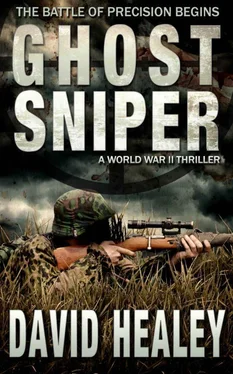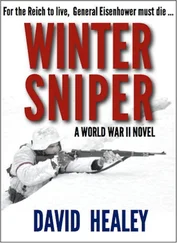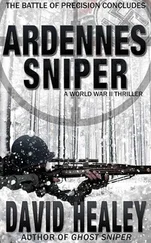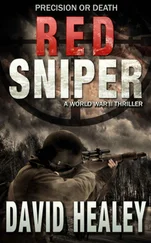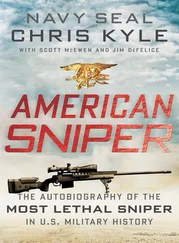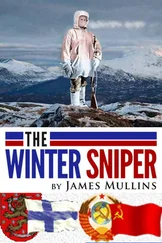Vaccaro laughed. “You can’t shoot for shit, Reb! You’re as bad as I am.”
Mulholland was surprised, but he didn’t let it show. He had already seen what Cole could do with a rifle. “That’s all right, Cole. Maybe today just isn’t your day.”
“Uh, sir?” Meacham pointed into the distance, toward the German POW camp. Three bodies lay sprawled on the beach, and several of the POWs as well as the guards were running around, trying to determine where the shots had come from.
“Holy shit,” Vaccaro said. “Reb shot them!”
Mulholland was stunned. “Private Cole, you can’t do that!”
Cole spat. “A lot of men died on this beach. What’s three more dead Germans? I reckon I’m just evening the score.”
“Reb, you are goddamn crazy,” Vaccaro said.
Mulholland wasn’t sure what to do. Technically, Cole had just murdered three prisoners of war.
“Your hillbilly is right,” their guide spoke up. “The Germans killed many innocent people.”
Mulholland was still undecided about how to react when the colonel picked that very moment to wander over from HQ. The lieutenant opened his mouth to say something about the prisoners, but the colonel spoke first. “If ya’ll are done shootin’ up empty bottles, do you think you could shoot some Germans?”
“Shit, sir, Reb here just did that.”
Vaccaro might have said more, but the lieutenant gave him a warning look. That goddamn Vaccaro, Mulholland thought. He couldn’t hit the broad side of a barn, but he could sure shoot his mouth off.
“What?” the colonel looked confused.
Lieutenant Mulholland started to salute, then dropped his arm upon remembering what their guide had said. “Yes, sir. We’ll move out right away.”
Toward nightfall, when it was safer to move, Von Stenger slipped away from the bridge. If he stayed, it would only be a matter of time before the Americans pinpointed his position. As he knew well from Russia, a sniper who kept moving was one who stayed alive.
So he and the boy hiked toward the beach and the sound of fighting. They kept to the smaller paths through the bocage, which reduced their chances of running into any Allied forces. The two of them alone could move silently and slip off the road, into the brush, whenever the need arose.
“Herr Hauptmann, are we going to stop tonight?” the boy sounded so weary, and Von Stenger could hear how he dragged his feet.
“If you stop, I will shoot you.”
That shut the boy up. Although Von Stenger was much older, years of hard campaigning had given him lean muscles and inured him to the discomforts of not stopping to sleep or eat. Around midnight they heard voices ahead in the darkness—German voices—and came across a small unit that was setting up a series of defensive fallbacks in the hedgerows. Von Stenger volunteered his services as a sniper, and the captain in charge gladly accepted, teaming him up with another pair of snipers.
“My name is Wulf,” said the taller sniper, a Wehrmacht corporal who appeared to be in his early twenties. He nodded at the other man. “That’s Schultz. You look old enough to be my father, Pops. Are you one of the reserve units that was sent in?”
In the darkness, Von Stenger knew the corporal could not see his rank. “No, I have been a sharpshooter for a while now.”
“You went through the sniper training school?”
“Yes, I was an instructor there,” Von Stenger said. He lit a cigarette and the flickering flame illuminated the Knight’s Cross he wore. “Then I was a sniper in Spain, Poland and Russia. And you?”
“This is my first time in combat… sir.”
Von Stenger quickly sized them up. Wulf had a tough, competent look about him. Schultz appeared more nervous and kept checking and rechecking his rifle.
“Remember your training, Corporal, and you will do fine,” Von Stenger said. “There will be many Americans here by morning. The woods and fields will be crawling with them. That I can promise you.”
The German plan was simple, yet highly effective, taking full advantage of the Norman terrain. The countryside was laid out like a patchwork quilt, with few roads, so that the dense hedgerows formed the seams of the imaginary quilt. It would be necessary for the Americans to move cross country. To do so, they would have to push from one field to the next. It was all a little like one of those old houses where one had to walk through an adjacent bedroom to get to the bath because the house hadn’t been designed with hallways. The Germans intended to make the Allied forces pay dearly for each step and every inch of territory.
The fields ranged in size from five or ten acres to expanses of twenty or even fifty acres. There were generally just one or two gaps in the hedge to allow a farmer access to his crops or livestock in the field. With their valuable head start on the allies, the Germans had placed snipers or machine gunners to cover the entrances to the fields. The only way in or out was through their gun sights. In essence, nearly all of Normandy was now an elaborate trap. This particular field was one of the first in from the beach.
“Wulf, we are going to do some shooting at daybreak tomorrow,” Von Stenger said. “The Allies are going to come pouring through here, but they won’t know what hit them.”
The three German snipers prepared to hide themselves at the far end of the field, which had a crop of tall winter wheat, but made certain they had a clear view of the entrance. There was an exit for themselves, but Von Stenger had Fritz help cut brush so that they could create a camouflage gate. It would only be a matter of time before too many Allied troops had made it into the field, but when that happened, the Germans could escape through the gate… then start the whole process over again in the next field over.
“Are you ready, Corporal Wulf?” Von Stenger asked.
The younger man licked his lips. “Indeed I am.”
“Remember, nothing too fancy. Take the body shot rather than the head shot. We are trying for kills here, not misses. We need those bodies to stack up like cordwood.”
All that was left to do now was wait for daylight.
• • •
Cole’s eyes flicked across the landscape, which changed abruptly as they moved away from the beach. Grass replaced the sand, woods superseded the dunes, and where there had been the constant surge of surf and machinery on the beach, there was now the rustle of leaves and birdsong. If it hadn’t been for the distant gunfire, they could have been going for a walk through the woods and fields back home.
Cole felt more at ease here than he had in months. He always had been a loner, having grown up in the woods and the mountains. The cramped quarters of Army life were not to his liking. Privacy was nonexistent. There was not so much as a toilet stall to grab a few minutes alone.
These weeks and even months of constantly crowded conditions had grated on Cole’s nerves, though he was the kind of man who built a sort of armor or shell around himself. Other men sensed his solitary nature and left him alone.
In the quiet and solitude of the French countryside, his senses slowly came alive again, tingling awake like a cramped limb that had fallen asleep in the night. He heard birds, the sigh of the wind in the trees and the whisper of it on the grass. The air smelled of rain and wet earth. The country sounds and smells made Cole feel like he was home. A part of himself he had forgotten about stirred and came alive.
“This ain’t so bad, is it, Lieutenant,” Vaccaro said. He sounded too loud for the hushed countryside. Vaccaro had a city voice. “We could be going up against Panzers. Those are the real bad asses. We just need to find a few stray Jerries with rifles.”
Читать дальше
